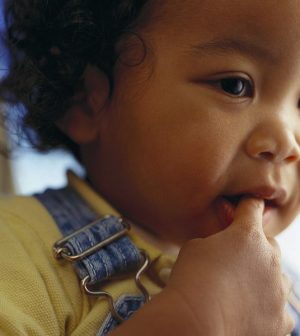- Recognizing the Signs of Hypothyroidism
- 10 Strategies to Overcome Insomnia
- Could Artificial Sweeteners Be Aging the Brain Faster?
- Techniques for Soothing Your Nervous System
- Does the Water in Your House Smell Funny? Here’s Why
- Can a Daily Dose of Apple Cider Vinegar Actually Aid Weight Loss?
- 6 Health Beverages That Can Actually Spike Your Blood Sugar
- Treatment Options for Social Anxiety Disorder
- Understanding the Connection Between Anxiety and Depression
- How Daily Prunes Can Influence Cholesterol and Inflammation
Spotting Asthma in Your Baby or Toddler

Diagnosing babies and toddlers with asthma is challenging, because it’s difficult to measure lung function in this young group. What makes diagnosis easier is knowing your child’s symptoms.
A leading pediatrics group offers some tips for parents who suspect their infants or toddlers may have asthma or are having symptoms that could suggest another health condition.
Your pediatrician will ask if your baby tends to wheeze, cough or breathe fast when he or she has a cold, is near animals, is in a dusty place or if there is smoke in the air, according to the American Academy of Pediatrics (AAP).
You should tell your child’s doctor about any excessive cough, particularly a nighttime cough or a prolonged cough after a cold even if there is no wheezing. Coughing can be the only asthma symptom in some people. Share whether you have family members who have asthma, hay fever, eczema, recurrent bronchitis or sinus problems, the AAP advised.
An unexplained frequent cough or daily cough in infants means you should have your child evaluated by a pediatrician or pediatric pulmonologist because it could be a sign of a serious disease.
When trying to diagnose what’s causing the problem, your pediatrician will listen carefully to make sure that the sounds your baby is making are coming from the airways of the lungs, the AAP said.
Sometimes babies breathe noisily as a result of laryngotracheomalacia, a temporary weakness in the cartilage near the vocal cords. They grow out of this as the tissues become firmer. Unusual conditions related to airway development or prematurity can also cause wheezing in infants.
Your child’s pediatrician isn’t likely to recommend allergy testing unless the wheezing always happens after exposure to an animal or certain food. Food allergy is rarely a cause of asthma in infants and toddlers. It may be a trigger for eczema, the AAP noted.
Your doctor may order a chest radiography during the baby’s first wheezing bout. If it’s determined that your child has asthma, that won’t likely be repeated because the bronchial tubes are not seen well in a radiograph.
If your baby is failing to grow or thrive, the doctor may test for other conditions, the AAP said. Certain tests, including a sweat test to rule out cystic fibrosis, may be necessary when your doctor wants to be sure your baby’s wheezing and chest symptoms are not caused by a condition with symptoms that are similar to asthma.
Sometimes the easiest and best way to diagnose asthma in a young child is to treat with asthma therapy and see if the child improves. Medications for asthma usually only help asthma and not other conditions, the AAP said. You can help the pediatrician by monitoring your child’s symptoms carefully and providing feedback on whether the medications are helping.
More information
The Asthma & Allergy Network has more on asthma in babies and children.
SOURCE: American Academy of Pediatrics, March 2021
Source: HealthDay
Copyright © 2026 HealthDay. All rights reserved.










